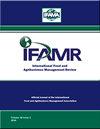信息能力对民族村寨农户的旅游生计有何作用?
IF 1.5
4区 经济学
Q3 AGRICULTURAL ECONOMICS & POLICY
引用次数: 0
摘要
旅游民生已成为人们摆脱贫困的必要民生决策。在互联网时代背景下,研究民族村寨农户如何借助信息能力参与旅游民生具有重要意义。本文运用资源协调理论,以湖南省江永县古兰瑶族乡为例,采用二元逻辑回归模型和模糊集定性比较分析方法,探讨农户信息能力对其旅游生计的影响机制。研究结果如下:第一,除金融资本外,其他生计资本和信息能力对农户参与旅游生计有显著影响。第二,当金融资本缺乏时,具有信息能力的民族村寨农户可以联合人力资本、社会资本、自然资本或物质资本来弥补金融资本不存在的缺陷,帮助实现旅游生计。第三,当人力资本缺乏时,有信息能力的民族村寨农户可以联合自然资本、金融资本和社会资本来弥补人力资本的缺失,帮助实现旅游生计。本文章由计算机程序翻译,如有差异,请以英文原文为准。
What role does information capacity play in the tourism livelihood of farm households in ethnic villages?
Tourism livelihood has become an essential livelihood decision for people to get rid of poverty. Under the background of the internet era, it is of great significance to study how ethnic village farm households can participate in tourism livelihood with the help of information capacity. Applying the Resource Orchestration Theory and taking Guolan Yao Village in Jiangyong County of Hunan Province as an example, this paper uses binary logistic regression model and fuzzy set qualitative comparative analysis method to explore the mechanism of farm households’ information capacity affecting their tourism livelihood. The findings are as follows: Firstly, in addition to financial capital, other livelihood capital and information capacity have a significant impact on farm households’ participation in tourism livelihood. Secondly, when financial capital is lacking, farm households in ethnic villages with information capacity can unite with human capital, social capital, natural capital or physical capital to make up for the non-existent defect of financial capital and help realize tourism livelihood. Thirdly, when human capital is lacking, farm households in ethnic villages with information capacity can make up for the absence of human capital by combining natural capital, financial capital and social capital to help realize tourism livelihood.
求助全文
通过发布文献求助,成功后即可免费获取论文全文。
去求助
来源期刊

International Food and Agribusiness Management Review
AGRICULTURAL ECONOMICS & POLICY-
CiteScore
2.90
自引率
0.00%
发文量
0
审稿时长
>12 weeks
期刊介绍:
The IFAMR is an internationally recognized catalyst for discussion and inquiry on issues related to the global food and agribusiness system. The journal provides an intellectual meeting place for industry executives, managers, scholars and practitioners interested in the effective management of agribusiness firms and organizations.
IFAMR publishes high quality, peer reviewed, scholarly articles on topics related to the practice of management in the food and agribusiness industry. The Journal provides managers, researchers and teachers a forum where they can publish and acquire research results, new ideas, applications of new knowledge, and discussions of issues important to the worldwide food and agribusiness system. The Review is published electronically on this website.
The core values of the Review are as follows: excellent academic contributions; fast, thorough, and detailed peer reviews; building human capital through the development of good writing skills in scholars and students; broad international representation among authors, editors, and reviewers; a showcase for IFAMA’s unique industry-scholar relationship, and a facilitator of international debate, networking, and research in agribusiness.
The Review welcomes scholarly articles on business, public policy, law and education pertaining to the global food system. Articles may be applied or theoretical, but must relevant to managers or management scholars studies, industry interviews, and book reviews are also welcome.
 求助内容:
求助内容: 应助结果提醒方式:
应助结果提醒方式:


